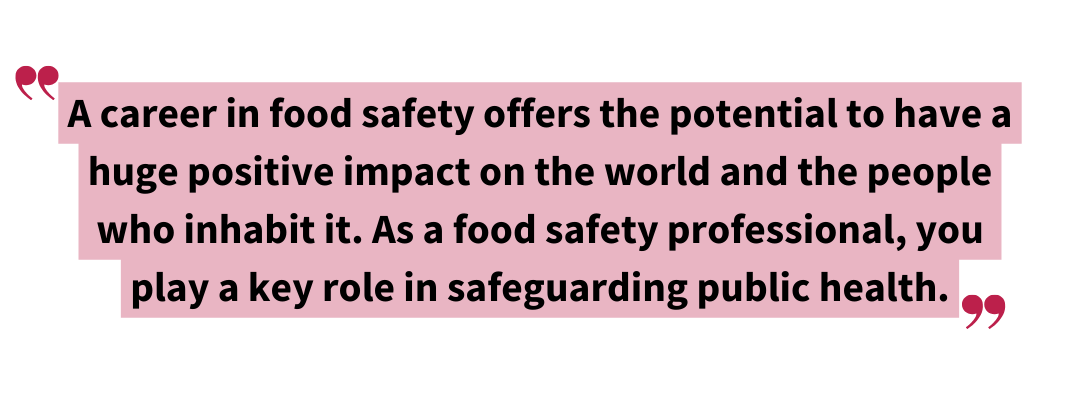What It Takes to Begin a Career in Food Safety
The food safety industry is facing an ongoing labor shortage, with demand for skilled workers soaring as the global food supply chain grows more complex (and more regulated). The U.S. Bureau of Labor Statistics projects an 8% “faster than average” job outlook for some food safety jobs from now to 2033.
Careers in food safety are essential to public health and offer a wide array of opportunities across industries for motivated workers looking to protect consumers. That said, entering the industry can feel daunting, with a well of terminology, regulations, and certifications that can feel like high barriers to entry.

Let’s demystify the process and see if a career in food safety is right for you.
Why consider a career in food safety?
Of course, if there’s a labor shortage, there will likely be plenty of job opportunities. But beyond just the numbers being in your favor, the food safety industry also offers many different positions in diverse sectors. The field spans agriculture, food manufacturing, food service, and public health organizations, so you’ll have options to choose from depending on your interests and skill set. Roles can include:
- Auditing
- Research and Development
- Quality Assurance
- Regulatory Compliance
- Food Defense
- Supply Chain Management
- Environmental Health and Safety
- Sanitation Management
- Risk Assessment
- Food Microbiology
- Product Safety Management
Perhaps most importantly, though, a career in food safety offers the potential to have a huge positive impact on the world and the people who inhabit it. As a food safety professional, you play a key role in safeguarding public health by ensuring food quality and protecting the food supply chain from contamination.
It’s not an overstatement to say food safety is a life-saving job.
How to Begin a Career in Food Safety
For those passionate about protecting public health, the food safety field offers unique opportunities, but it’s essential to first build a strong educational and practical foundation.
Here’s what aspiring food safety pros need to get started and thrive.
Education
A solid education in fields like food science, microbiology, or regulatory affairs provides the groundwork for a successful food safety career. Programs in these areas cover critical concepts like microbiological risk assessment, chemical analysis, and regulatory compliance.
Universities and training organizations often offer scholarships or incentives for those pursuing food safety, encouraging new talent in a vital field.
Certifications and Training
Industry-recognized certifications are also vital to breaking into food safety — after all, you can’t enforce food safety protocols if you don’t know the rules. Being trained as a Preventive Controls Qualified Individual (PCQI), for example, can set you apart from other candidates, as some facilities are required to maintain a PCQI on staff to help implement food safety plans.
Familiarity with systems like Hazard Analysis and Critical Control Points (HACCP) and regulations like the Food Safety Modernization Act (FMSA) are also commonly required. Training in these areas helps demonstrate a candidate’s competence in key food safety protocols and an understanding of common food safety regulations.
Finding, Networking, and Applying
Landing your first job in food safety takes research and a proactive approach. Explore food safety career boards to find available roles in a variety of settings, including food production facilities, regulatory agencies, and consulting firms.
Additionally, networking can be a worthwhile investment for any job seeker. Attending food industry job fairs and career events is an excellent way to build up that network, and can help you meet potential employers and learn more about specific food safety roles.
Staying Up to Date
While starting a career in food safety requires a mix of specialized knowledge and industry certifications, excelling in your food safety career takes a commitment to staying informed about ever-evolving standards and practices.
Staying up to date on food safety trends and regulatory changes is critical to maintaining a successful career. With new developments in food technology and an increasingly strict regulatory landscape, continuous learning is key.
Industry publications, training courses, and conferences can help you stay at the forefront of food safety best practices, allowing you to adapt to changes and excel.
Setting Yourself Up for Success With a Career in Food Safety

The food safety field offers a dynamic, impactful, and rewarding career path with the chance to do real good in the world.
Embracing continuous learning through certifications, education, and industry engagement will set you up for a successful, lasting career in an essential industry. Explore AIB International’s training programs to kickstart your career in food safety.


